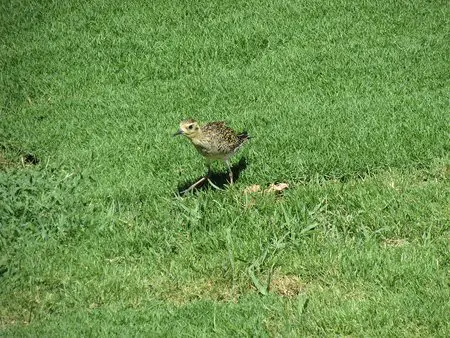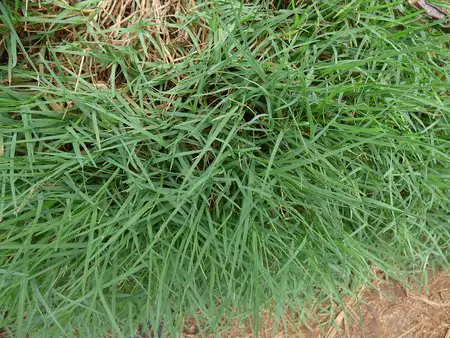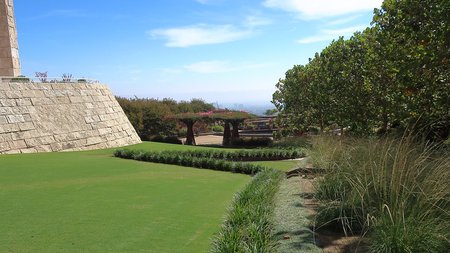Bermuda Grass
out Bermuda grass, its nature and use
Common Bermuda grass, also known as Couch Grass or Wiregrass is scientifically called the Cynodon dactylon. It is actually a type of weed that originated from African Savannah and India. The name is Bermuda Grass because it was first introduced in the USA from Bermuda. Bermuda grass is a perennial lawn or turf grass, or grown as forage (pastures).
It needs sun and grows well in warm temperatures such as in tropical, sub-tropical and the transition zones like Southern US, South America, Australia, Africa, India etc.
Common Bermuda Grass
Photo: Forest and Kim Starr, flickr, cc by 2.0
The color of this grass is usually dark green and spreads by rhizomes and stolons. This grass has the ability to grow in extreme climate conditions because of its extensive root system. It has a good tolerance capacity against insects and diseases. This grass is largely used on home lawns, golf courses, sports fields, parks, coastal areas and pastures.
In the US, Bermuda grass is widely adapted in the southern parts. However in Florida, it has some difficulty to grow. It is susceptible and vulnerable to the sting nematode, a pest which is very common in Florida.
In dry weather Bermuda grass generally turns brown in color but recovers quickly after a heavy rainfall. The leaves become green with purple tips. It spreads in a very short time during rainfall and also has good tolerance in drought and cold conditions. It is the best grass for a hot, sunny or even adverse climate. It can even grow in sandy to clay soil with low cost maintenance.
Due to its rapid growth, Bermuda grass is easily available throughout the year. The main characteristics of this grass are its high persistence and aggressive nature. Bermuda grass does not grow well under low light (i.e. shaded) conditions. The sun loving Bermuda grass can grow easily in poor soil as well and have the ability to recover quickly from damages such as cutting, fires etc.
It can tolerate both acidic and alkaline soil and is highly tolerant to saline conditions. Bermuda grass can survive some flooding but does best on well-drained sites. Although it may persist under low fertility, Bermuda grass has a high nitrogen requirement for achieving a good quality lawn.
Bermuda Grass (Close Up View)
Photo: Forest and Kim Starr, flickr, cc by 2.0
Bermuda grass needs simple methods for care, maintenance and mowing. It also has fairly strong insect and disease resistant capacity. Due to its long root system, it's quite difficult to destroy or kill this grass. The aggressive nature of the grass can easily affect adjoining flower beds where it can itself become fast spreading weeds that are difficult to eradicate. In order to address such a situation, repeated applications of appropriate herbicide on the flower beds are necessary.
Bermuda grass is also widely used for farming and animal husbandry. In India, it is extensively used as cattle feed and also for controlling soil erosion from excess rains or over-watering. The ancient Romans used the liquid of Bermuda grass stem as Diuretic medicine. In modern homeopathy, Bermuda grass juice is used as an anti allergen. It also has application as antiseptic.
Several types of seeds and sods of Bermuda Grass are available in the market. A decision on the type or quality of the grass for growing a lawn or a turf depends on several factors and desired characteristics such as the degree of disease and insect resistance, cold tolerance, time in which the lawn needs to be established, fineness of texture, ease in plantation, cost, etc.
Types of Bermuda Grass
There are two broad classifications of Bermuda Grass - the Common Bermuda Grass which are available in form of seeds, and Hybrid Bermuda which are available in form of sods, plugs and sprigs.
There are several varieties of Common Bermuda seeds such as the Blackjack, Ormond, Jackpot, Oasis, etc, as well several types of Improved Common Bermuda Grass seeds. Types of Hybrid Bermuda Grass include Tifway-I, Tifway 419, Tifway-II, Tifgreen, Tifeagle, etc. Both Improved Common Bermuda and Hybrids are used in lawns while Hybrids are also used in playgrounds and golf courses.
What is Hybrid Bermuda Grass?
These grasses are created by breeding common Bermuda grass with another type of grass in order to get certain qualities. They are fine in textures, highly tolerant to disease and insects and offer compact growth, but they are not available in seeds. The hybrid variety is mainly used to create sods, plugs and springs which can be laid to create a beautiful lush green lawn. However, the sods are more expensive than seeds.
Hybrid Bermuda Grass (Tifway)
Photo: cultivar413, flickr, cc by 2.0
How to buy Bermuda Grass?
As you can understand by now that there are various types of Bermuda Grass that are now commercially available including the Common Bermuda and Improved Bermuda (which are available in seeds) as well as Hybrid Bermuda (which is available in form of sods, plugs and sprigs). And within each broad type, there are many other types. Many companies market these products under their own brands.
How to plant Bermuda Grass
Ideal time for planting or seeding Bermuda grass is when the weather is warm and the air temperature in the range of 75-90 degrees (F). Bermuda seeds germinate in seven to fourteen days and fully grow in grass form within 60 to 90 days.
Best time to seed is between Mid-May to August because the soil temperature remains warm around this time. You need to ensure proper soil conditions (including pH factor) and follow the right procedure of tilling, raking, seeding, and watering to get the optimal results.
While the entire process of growing the grass from its seeds is relatively simple, but it may take about a full year and sometimes longer in order to fully establish a lawn of standard size.
Bermuda Sods and Its Use
Sods are the cut-outs of grass beds where the top layer is the grass and the bottom layer is the soil which are held together by the root system of the grass. These sods are mostly made of hybrid Bermuda grass. They are fine in texture but can be expensive. An advantage with Bermuda grass sod is, a lawn can be established quickly within 2 to 3 weeks time, while fully establishing a lawn from Bermuda seeds can take a long time and sometimes up to a year or two. However, for consistent growth and development, the sods require high level of care and maintenance.
Go through
Bermuda Sod for details about the various types available in the market, their characteristics, indicative costs, etc. Also, check out
How to lay Bermuda sod for a step by step guide on how to plant the sods.
How to maintain a Bermuda grass lawn
You need to follow a proper calendar maintenance schedule in order to maintain a healthy Bermuda lawn throughout the year, because the process of mowing, fertilizing, watering, cultivation, disease control, weed control and renovation varies depending on the season, state of the grass and also on the type of Bermuda Grass used (i.e. Common or Hybrid variety).
For example, during summer Bermuda grass needs 1 to 1.25 inches of water in the soil on a weekly basis to retain its color. One of the ways to figure out when the grass is in need of water is when you can see the leaves drooping and having developed a bluish tinge at the end. Bermuda grass also requires frequent mowing all through the year due to its aggressive growth and to keep its height within 1 - 2 inches (for Common Bermuda, lesser for hybrids), but in summer, the frequency of mowing needs to be more.
Before fertilizing your Bermuda lawn, you should ideally get the soil tested in order to determine the exact nutrient requirement (i.e. nitrogen, phosphorus and potassium, as well as lime). Note that Bermuda Grass grows best when the soil pH level is between 6 to 6.5. You will also need to keep an eye on and do timely weed control, insect control and disease control if necessary apart from annual aeration.
Fertilizers for Bermuda Grass
There are essentially two types of fertilizers used for Bermuda grass - Organic fertilizer and Inorganic ones. Organic ones include the basic nutrients such as Nitrogen (N), Phosphorus (P) and Potassium (K)... you can buy commercially available Organic fertilizers that come in the specific ratio of NPK. These fertilizers need to be applied periodically and the application process depends on the soil condition, seed types and season.
The Inorganic fertilizers for Bermuda Grass mainly includes sulfur and lime which are mainly used at the time of preparing the soil before seeding Bermuda grass. These are used to create the right balance of the soil and for maintaining a soil pH level between 6 to 7 that is ideal for growing healthy Bermuda grass.
Go through
Bermuda grass fertilizers to know about the different types of fertilizers available for Bermuda grass, when and how much to apply and the other best practices.
Weeds that affect Bermuda Grass
There are two broad categories of weeds that can be found in Bermuda Grass -
Common Broadleaf Weeds that do not look like grasses and can easily be distinguished from Bermuda grass, and
Common Grassy Weeds that look like grass and can be quite difficult to identify and isolate from Bermuda grass. Go through
Weeds in Bermuda Grass to know about the different types of weeds that may affect Bermuda grass.
In order to control and eradicate weeds in Bermuda Grass, you may need to follow several methods. In the first place, try to ensure that the weeds do not germinate and emerge by applying pre-emergent herbicides. If the weeds get germinated, you need to make use of post-emergent herbicide. You can also mechanically try to remove the weeds by frequent mowing and pulling them out by hand.
Once your lawn is free of weeds, you should follow the best practices of maintaining a Bermuda lawn which includes steps such as 1. Properly fertilize the lawn, 2. Properly water the lawn, and 3. Mow at the correct height and frequency (Common Bermuda grass should be between 1 and 2 inches in height. Hybrids should be within 1.5 inches).
How to eradicate Bermuda Grass that acts as weeds
Because of its aggressive and persistent nature, Bermuda grass itself can be a weed to other grasses and is very difficult to kill or eradicate. Go through
How to kill Bermuda grass for full information on herbicides, time of application and methods to use when you want to eradicate Bermuda grass from your lawn.
Zoysia or Bermuda Grass: Which is better for a lawn?
When you look from a distance, well cultivated and maintained lawns of both these two grass types look quite similar. But when you look closely, there are a lot of differences. Zoysia gives thick dense coverage of true green turf and looks beautiful although the grass is stiffer and feels more prickly. On the other hand, Bermuda is softer and can have different shades of green.
Unless the conditions are right, Zoysia can take a long time to entirely cover the lawn (2 - 3 years or even longer), while Bermuda grass spreads quite fast and can be difficult to control unless you follow the right maintenance procedure. There are important differences between the two when it comes to sunlight requirement, temperature, growth, tolerance, expenses, over all maintenance etc.
Visit
Zoysia or Bermuda to get a full comparison between the two and a guide to choose the right type for your lawn.
Bermuda Grass vs. Fescue: Which is right for your lawn?
If you are deciding between Bermuda or Fescue to establish a lawn, then before you jump into a conclusion, you need to know the various implications of both types when it comes to climate, soil conditions, tolerance to insects & disease, maintenance, texture & colors, and of course cost.
Both these grass types come in form of seeds of various types and sods. Bermuda is primarily a warm-season grass while Fescue is a cool-season grass. Bermuda requires sunny lawn while Fescue can grow in shades as well. Fescue requires low maintenance while Bermuda, particularly Hybrid Bermuda Sods that give you turf-like luscious green lawns, require careful and passionate care.
Bermuda grass grows vigorously and can itself become weeds for other plantations, while Fescue is not aggressive and is capable of warding off its weeds on its own. Fescue texture is finer compared to Bermuda grass. Bermuda seeds and sods are comparatively costlier compared to that of Fescue.
Various other types of grasses
There are many other types of grass that are often compared with Bermuda grass both in seed or sod form. Go through
Other types of grass for comparisons and know if Bermuda Grass is the right choice for you, or you might be happier to explore another type.
|
 By Raj Bhattacharya By Raj Bhattacharya
Raj, a seasoned travel writer and Bermuda destination expert, has extensive global travel experience. This website reflects his profound insights, garnered over nearly two decades of dedicated findings and research on the island. Raj has assisted countless Bermuda-bound visitors by providing direct, personalized responses to their queries and imparting his wealth of knowledge through this platform. This site serves as an indispensable guide for those seeking informed and reliable insights into Bermuda's treasures.
|



 By Raj Bhattacharya
By Raj Bhattacharya